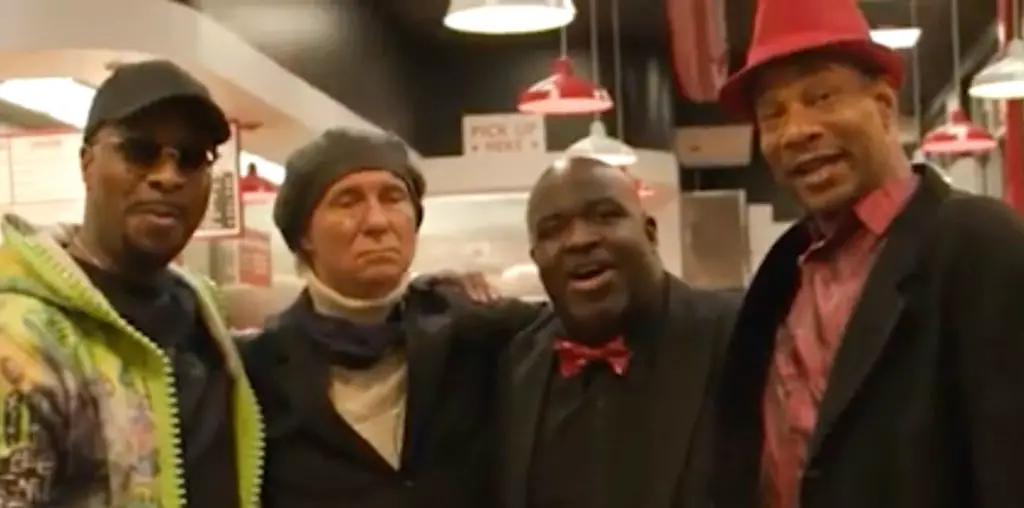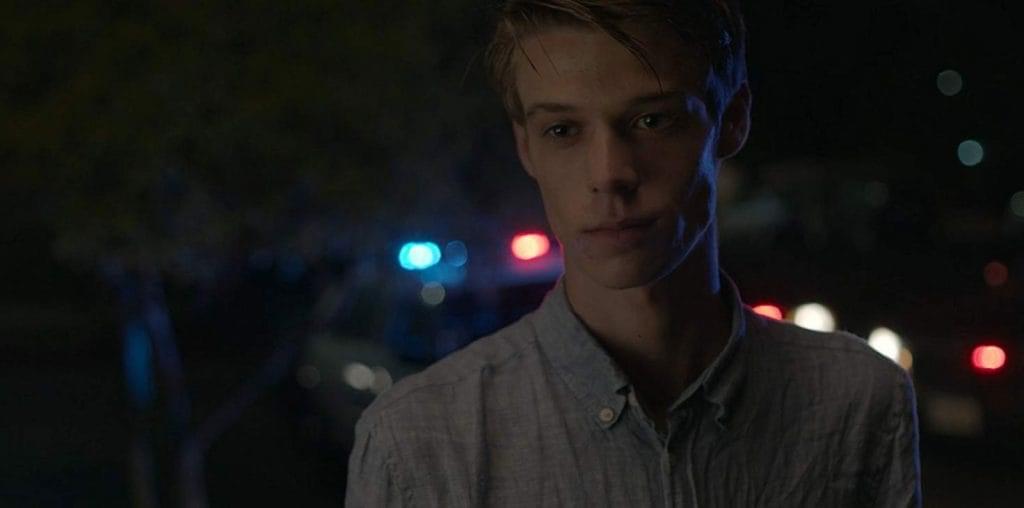
When making a faux documentary about musicians and/ or the music industry, it takes quite a bit of originality not to be overshadowed by This Is Spinal Tap. While scores of filmmakers have tried, only a few have succeeded, such as Woody Allen’s charming and underrated Sweet And Lowdown or the hilarious Sons Of Provo, which used religion as its backdrop. So, when I state that writer/ director/ star Justin Connor’s new movie The Golden Age compares handsomely to those titles, please note the revered talent he joins.
The Golden Age chronicles Maya O’Malley’s (Justin Connor) awaited return to the music industry after a series of controversial interviews years ago led to a downward spiral. The inclusion of David Lovering, drummer for The Pixies, adds a sense of realism that allows the audience to believe in the immense promise each producer, agent, technician, and recording artist sees in Maya. That is kind of it, plot-wise, with interviews with various folks, real and fictional, interwoven with current footage and conversations with Maya about where he is now versus when his downfall occurred.

“…eloquently ties the themes, ideas, character progression, and styles of music together…”
Each and every song written and performed for The Golden Age was catchy, sung well, and very slickly produced. Each track strikes a delicate balance of distinctive, but radio-friendly; playful, yet profound. The standout is the title song, performed near the end. It eloquently ties the themes, ideas, character progression, and styles of music together perfectly. Bear in mind, music appreciation is highly subjective so that taste may vary considerably.
Julian Milo’s editing style is much more varied and engaging than one might think upon hearing “fake documentary” style. Utilizing split-screen to contextualize elements gives the film an almost rhythmic beat, bouncing along like one of the songs Maya writes. There is a fantastic moment where he is being interviewed in one section of the screen, while another depicts him recording a song. We can’t hear the song he’s recording, just the interview, while atop the screen stretches a panoramic view of the beach where a conversation between Maya and his best friend just took place. Seeing these scenes fold into each other, visually, and in some cases, auditorily, is exciting and fun. The cinematography, courtesy of Jonas Navickas, is acceptable. While certainly never bad, there is only so much one can do with a couch in an agent’s office or recording studio. It suits the needs and look of the film well, just never rises above that.
The movie’s secret weapon is Connor. I mean that in regards to each hat he wore during the production. He wrote the songs and music for the movie, and the songs are amazing. He wrote the screenplay, and the characters are strong, and the plight of Maya and his return is engaging. Connor portrays Maya as a man of intense passion and beliefs, but never makes him pretentious or stuck up. As a director, he finds an emotional honesty that runs through the movie. And he keeps things moving along nicely, for the most part.

“…such a passion project for Connor… the songs are amazing.”
While there is a lot of good to be found, there is one issue with the movie. Clocking in at approximately 102 minutes the film loses steam around the one hour mark for 20 minutes or so. The audience is subjected to three music video-esque sequences all of which involve Maya wandering around the desert. They are virtually indistinguishable from each other, and accomplish nothing, save for testing the viewer’s patience. The most frustrating aspect is that immediately following this we get some really great character development, but it takes the audience a moment or two to get back into the swing of things; what, with their brains being tediously zapped by pointless, repetitive imagery. It seems that this was such a passion project for Connor, he may not have been able to part with any song or sequence, even if it was to the detriment of the story at hand.
Mark Kelly plays one of Maya’s friends, Billy Paulson, and he is very good. The concern for Maya comes across nicely. Playing Jane Healy, a music journalist, Joanna Leeds is pretty good. Popping up every and now then, she sells the jargon and hype well. Christopher May is John Crispin, and he is excellent. He plays the world-weary industry veteran perfectly, never falling into the traps or cliches one might expect. Maya’s manager, Barry Rosenthal, is portrayed by Brian Jacobs. He brings a sense of loyalty and genuine sympathy for Maya to the role, and his reaction to the controversy and increasing demands of the star are believable.
The Golden Age is a bit too long and fails to fully engage the audience’s attention for all of its runtime. But don’t let that stop you from seeking out this otherwise impressive movie. Writer/ director/ producer/ musician/ lyricist/ star Justin Connor is a force to be reckoned with and has a fulfilling career ahead of him.

The Golden Age (2017) Directed by Justin Connor. Written by Justin Connor. Starring Justin Connor, Christopher May, Brian Jacobs, Mark Kelly, Joanna Leeds, Beverly Hynds.
Grade: A-


